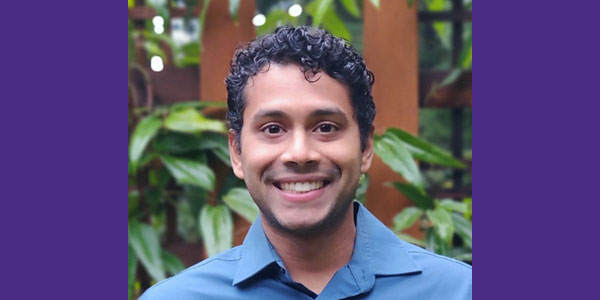Alumnus Nishant Velagapudi shared his experience at an AI-based medtech company with 2025 capstone students – and described the bioengineering mindset that Professor Christopher Neils helped him refine.
As Chief Technology Officer of Perimatics, Nishant Velagapudi has a simple rule for his team: “The same problem should never stump us twice.”
He developed the rule, over the years, based on what he calls a “bioengineering mindset” – the willingness to dig to the root of a problem, to develop a deep understanding of that problem, to break its complexities down into a set of individual challenges, and to continue to learn throughout your career.
“The problem-solving skills, commitment to learning, and discipline taught in BioE have been key in any success that I’ve had,” he said. Velagapudi was the invited speaker at the 2025 Bioengineering Capstone Showcase. Dozens of seniors and Masters of Applied Bioengineering students also presented innovative design solutions for contemporary clinical and healthcare challenges during the event.
[Professor Christopher Neils’s] influence helps students create a mental framework that encourages deep understanding and continuing learning. I feel that this mindset of ongoing learning and deep understanding has been one the most important factors in my career so far. – Nishant Velagapudi
Velagapudi – who earned degrees in bioengineering and informatics from UW in 2016 – credits Professor Christopher Neils with defining the bioengineering mindset and bringing it into relief. Neils has run the bioengineering capstone program for many years.
“His influence helps students create a mental framework that encourages deep understanding and continuing learning. I feel that this mindset of ongoing learning and deep understanding has been one the most important factors in my career so far. In the modern technology industry, figuring out how to do something is 90 percent of the actual work,” Velagapudi said.
His alumni status gives Velagapudi a special perspective on the edge that the capstone program gives Bioengineering students.
“They force you to identify a problem – or why should I work on something. To figure out what you can do about it – what should I do and can I do. To develop an implementation plan – how will I achieve this. And to execute that plan and assess success, progress, and what is remaining. It’s a translational and guided experience on key aspects of problem solving in the real world.”
The quality of these capstones and consistent success is proof that BioE graduates can have an impact anywhere they go – even if that landing spot may be atypical. – Nishant Velagapudi
After landing at Berkeley for a masters degree in data science and then Microsoft, Velagapudi joined Perimatics in 2021, about two years after the company was founded. Perimatics builds real-time, AI-driven decision support tools so doctors and clinicians can provide individualized care before, during, and after surgery. The company is a spin-out of the University of Washington, based on smart anesthesia technology initially developed at the university. Velagapudi is integral to the company’s shift to a cloud-based approach and adding machine-learning and generative AI features.
“We’re always asking how our products can provide the right information to the right people at the right time to improve anesthesia and perioperative care,” he said. “[It is] vital that hospitals leverage the richness of their data to reduce costly inefficiency. Ultimately, our partnership with UW helped us identify what we feel is a critical issue felt across the nation.”
“I’ve been privileged to work with incredible people at every stage of my education and career. UW Bioengineering stands out: being surrounded by such a talented cohort inspired me to become better every single day.”



